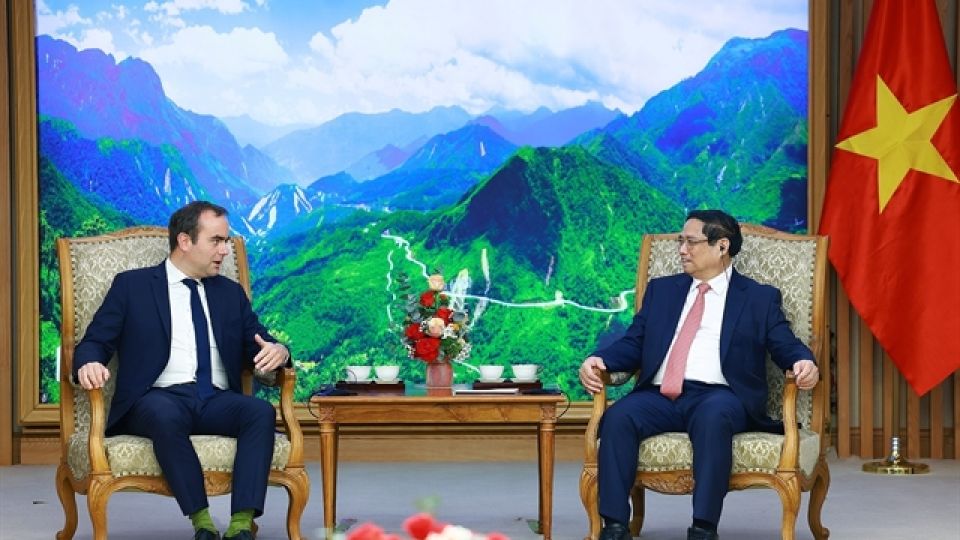May 7, 2024
HANOI – French Minister of the Armed Forces Sébastien Lecornu’s visit “holds significant importance in strengthening the Việt Nam-France Strategic Partnership and reaffirms their commitment to leaving the past behind and moving forward”.
That remark was made by Vietnamese Prime Minister Phạm Minh Chính on May 6 when he received French Minister of the Armed Forces Sébastien Lecornu, who is on a visit to Việt Nam to commemorate the 70th anniversary of the Điện Biên Phủ victory.
Reflecting on Việt Nam’s turbulent history of war, Chính affirmed his country’s deep appreciation for peace, cooperation and development.
He reiterated Việt Nam’s high regard for its strategic partnership with France and conveyed greetings and an invitation from General Secretary Nguyễn Phú Trọng to French President Emmanuel Macron to visit Việt Nam.
He also wished to extend an invitation to French Prime Minister Gabriel Attal to visit the country soon.
He expressed satisfaction with the flourishing Việt Nam-France relationship, which has strengthened across various domains over the past decade, notably in culture, architecture, people-to-people ties, politics, economics, education and defence.
He noted that France was the first Western nation to establish military ties with Việt Nam in 1991. He also welcomed the positive outcomes of discussions between the French Minister and his Vietnamese counterpart during this visit.
He proposed that the two sides continue to exchange high-level delegations and prepare for the upcoming visit to Việt Nam by French President Macron.
He also suggested deepening bilateral ties in areas including climate change, energy transition, digital economy development, transportation infrastructure and science and technology. He also pressed for continued mutual support at international and regional forums to address global issues.
The Prime Minister requested that France support and promote the early ratification of the Việt Nam-EU Investment Protection Agreement and the removal of EC’s yellow card for Vietnamese seafood, given its efforts in combating illegal unreported and unregulated fishing.
He also requested the establishment of new cooperation mechanisms in human resource training, defence exhibitions, peacekeeping, war remediation and mine clearance.
France was also asked to strengthen cooperation in preserving, restoring and promoting the values of the Điện Biên Phủ battlefield, especially in sharing archival materials related to the historic site.
For his part, Minister Lecornu reaffirmed France’s high regard for its relationship with Việt Nam and admiration for the country’s spirit of independence and self-reliance.
He highlighted the significance of sharing historical memories and expressed gratitude to Việt Nam for its active cooperation and support in repatriating the remains of French soldiers who died in the war.
He revealed that one of the goals of his visit is to prepare for the upcoming visit of President Macron to Việt Nam, underscoring the French leader’s strong desire to strengthen substantive ties between the two countries.
The Minister said he would discuss with relevant French agencies how to promote cooperation projects and expressed hope that the two countries would continue to cement defence cooperation commensurate with the Việt Nam-France strategic partnership.
At the meeting, the two statesmen also discussed regional and international issues of common interest.
They emphasised the importance of the freedom of navigation and peaceful settlement of disputes following international law, especially the 1982 United Nations Convention on the Law of the Sea, and the full implementation of the Declaration on the Code of Conduct in the East Sea (internationally known as the South China Sea).


